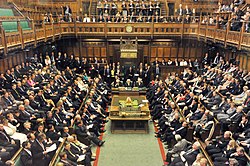Here Comes the New Boss…

Same As the Old Boss… I mentioned before the election that Labour really weren’t the party of change that they were claiming to be. I said on a number of occasions that they were basically the continuity party and that their policies were functionally almost identical to the Tories they were seeking to replace, but with more competent personnel. Yesterday a vote in the Commons demonstrated that this was indeed a correct analysis and that Labour is much more interested in party politics than the good of the country. What Happened? Yesterday MPs had the opportunity to vote on an amendment to the House’s response to the King’s Speech, which sets out the aims of the government now that Parliament has been reopened. The standard unamended response was: That an humble Address be presented to His Majesty, as follows: Most Gracious Sovereign, We, Your Majesty’s most dutiful and loyal subjects, the Commons of the United Kingdom of Great Britain and Northern Ireland in Parliament assembled, beg leave to offer our humble thanks to Your Majesty for the Gracious Speech which Your Majesty has addressed to both Houses of Parliament. Address to be presented to His Majesty by Members of the House who are Privy Counsellors or Members of His Majesty’s Household. Hansard This is a fairly standard response to a King’s Speech, and is entirely non-contentious to simply pass without further comment. However, it is also an opportunity for minority parties to point out to the government that they have missed some key issues that really ought to have been included. In the case of the amendment proposed by Christine Jardine MP (Liberal Democrat, I might add), these issues were: The right to see a GP within seven days A guarantee for cancer patients to start treatment within 62 days from urgent referral Free personal care in England Better support for carers, and a cross-party commission on social care An end to the scandal of sewage dumping against which the previous Government failed to take action, including by replacing Ofwat with a new regulator Support families with the cost of living Tackle poverty, including by introducing a national food strategy, extending free school meals to all children in poverty, and by scrapping the two-child benefit cap Ensure that rural communities and farmers receive adequate support Reform the system for parliamentary elections by replacing first-past-the-post with proportional representation, so that every vote counts The new Labour government voted this down. Not only that, they withdrew the Whip from seven MPs that voted to amend the King’s Speech response (NB, they actually voted for an amendment from the SNP which only focused on the child benefit cap – they didn’t even go so far as to vote for this amendment with its various additional benefits for the country), including the former Shadow Chancellor, John McDonnell. Frankly there is nothing in this amendment that should warrant this type of action from Starmer. His party supports all of these, including proportional representation, so he does not have a mandate from his own party to ignore these requests, let alone the fact that almost every other party in Westminster voted for this amendment (Tories notwithstanding, given they are responsible for most of the mess this would have addressed). Danny’s Debut This year I lost the Uxbridge & South Ruislip election to Danny Beales. At the time I was not hugely disappointed with this because during the hustings Danny set himself out to be progressive in the true sense of the word. Nevertheless, he joined the Labour masses in voting against this amendment. Shame on you, Danny. Every single one of these proposals was in line with what a true progressive would have wanted, and you used one of your very first appearances in our Parliament to vote to retain Tory policies that have harmed our country and our constituency. You should have joined John McDonnell in voting for this amendment if you wanted to be taken seriously as a progressive, but it seems that you have chosen to simply fall in line with what Starmer demands even when it contradicts your own personal morality. A fine example of putting party before country, something you were very keen to accuse Steve Tuckwell of doing. Frankly, if you want to be a progressive, you are clearly in the wrong party. Labour is not a progressive party, as demonstrated by suspending several prominent MPs who dared to vote for some actual progressiveness.
Swearing in Parliament

This week we have seen a load of MPs swearing in Parliament, and one in particular seems to have landed in hot water as a result. I am of course referring to the official “swearing in” ceremony for Parliament, and the MP that has gotten in trouble is Clive Lewis, Labour MP for Norwich South, who essentially took the oath under protest and was forced to re-swear because the wording wasn’t quite right the first time around. So what is this swearing in Parliament all about, and why is Clive Lewis generating controversy? The Oath Swearing in is a perfectly reasonable starting point for Parliament. In many situations we require an oath, most obviously when giving evidence in Court, but also when signing up to one of the branches of the military. In the case of the Court, the oath is to tell the truth, while with the military it is an oath to obey the chain of command right up to the monarch. In reality, all military decisions are made by Parliament or lower down the chain of command, so the reality of this is that the oath of allegiance is to Parliament wielding the power of the sovereign. Members may choose to take a religious oath or make an affirmation, but the overall wording is very similar. The official wording for the affirmation is as follows: I do solemnly, sincerely, and truly declare and affirm, that I will be faithful and bear true allegiance to His Majesty King Charles, his heirs and successors, according to law. UK Parliament Lewis’ Lapse As already mentioned, Clive Lewis has been forced to re-swear the oath under threat of losing his seat if he doesn’t comply and potentially being subject to a financial fine. In addition, he would be unable to participate in the debates and votes that his constituents have elected him to Parliament to represent them in. One might be forgiven for assuming that there was some major failing in how Lewis acted up to this point to make that threat against an elected official justifiable. Clive Lewis is a republican. He believes that the country would be better off without a monarchy, and on that point I agree based on the axiomatic principle of equality of opportunity. As such, he swore his oath with a preamble basically stating that he was a republican, hoped that he and his fellow MPs would be able to swear an oath to their country in future, but then proceeded to make the affirmation required of him. Except that he missed the words “his heirs and successors”. Evidently someone in Parliament considered this enough of a lapse to make him repeat the oath with the correct wording under threat of not being allowed to represent his constituents otherwise. There was then uproar from the monarchists in society, that he should not be allowed to be an MP at all because he clearly didn’t believe in the oath. This is an absurdity on so many levels. Republican Representation In the UK, the group of people who want to see the monarchy abolished are known as republicans. This is somewhat confusing when considering the people who normally come to mind when using the word “republicans”, but this is UK politics, not the US. At the moment, depending on how the questions are posed, upwards of 35% of the UK population are republicans, in that they either actively want to to see the monarchy abolished or they don’t see any reason why the monarchy should have an active role in UK politics any more. Philosophically, it is fairly easy to see why such people exist. If we start with the principle that all people should be born with equality of opportunity, the idea of a hereditary position that cannot possibly pass to anyone else regardless of their merit is antithetical to the very concept of fairness. The flip side is that someone who doesn’t have to earn their position can have a more impartial impact on politics, in that they don’t have to consider whether people will approve of the necessary actions they have to take. This might have at least some merit if our monarch genuinely had an active role in everyday politics, but they don’t. The monarch has not actually wielded power over Parliament contrary to Parliament’s will in centuries, so in essences the role of monarch is that of a figurehead in practice. A Problematic Practice The problem is that this is not what the current oath does. In essence, the oath is a throwback to when Parliament really did serve solely at the whim of the monarch, and that monarch could directly intervene in Parliament and remove “traitors”. Now, Parliament is itself sovereign, the highest legislative body in the land, and we as citizens have a right to expect that our MPs – if they promise to do something – will either do it or make a real effort to do it. This oath essentially says that they believe the monarch to be a higher authority than them, that they will obey commands from the monarch even when it contradicts the interests of the country or their constituents. There are plenty of people who say “it’s fine, they don’t really mean it” but that to me is incredibly dangerous. It is requiring that the first course of action for our MPs, those people that we trust to make rules in accordance with what they have promised to do when campaigning, make a promise that they fully intend to either ignore or break. The contempt this shows for the basic principle of honesty in our leadership should worry everyone, whether monarchist or republican. A Wider Issue Parliament has made some significant strides towards modernisation in recent years (though it still has a very long way to go), but this oath is one example of something that badly needs to be updated and yet has no means of doing so. After all, in order